Table of Contents
- President's corner
- Working Towards the 2025 ISHPSSB Meeting in Porto
- ISHPSSB 2025: Call for Session Proposals
- 2025 Grene and Callebaut Prizes — Call for Submissions
- ISHPSSB Fundraising [Advisory] Committee
- Lucie Laplane — New ISH Listserve Moderator
- ISH's Wikipedia page
- An interview with Jun Otsuka about his book, Thinking About Statistics: The Philosophical Foundations
- Recent publications
- Credits
President's corner
A lot has been happening in the last six months, so much so, that I keep rewriting and editing this report lest it get too long for the newsletter. Our committees are unusually active this year, I am happy to note, thanks to the ambitious and energetic efforts of our volunteers, but also because we are done with playing catch-up from the pandemic slowdown. The council has been meeting regularly, as has the executive, and with them, and others, I have been working my way through old minutes, programs and newsletters as well as drawing on my own institutional memory not just to update our archives but to also gain a sense of where we are, how we got here, and even who we are, because it was obvious to me in Toronto last summer that the organization has changed, and continues to change rapidly. It is becoming younger, more diverse, and more willing to entertain creative new approaches from even more disciplines–if you were lucky enough to see the videos of the Flash Talks, you'd know exactly what I mean about the creative energy in the organization.
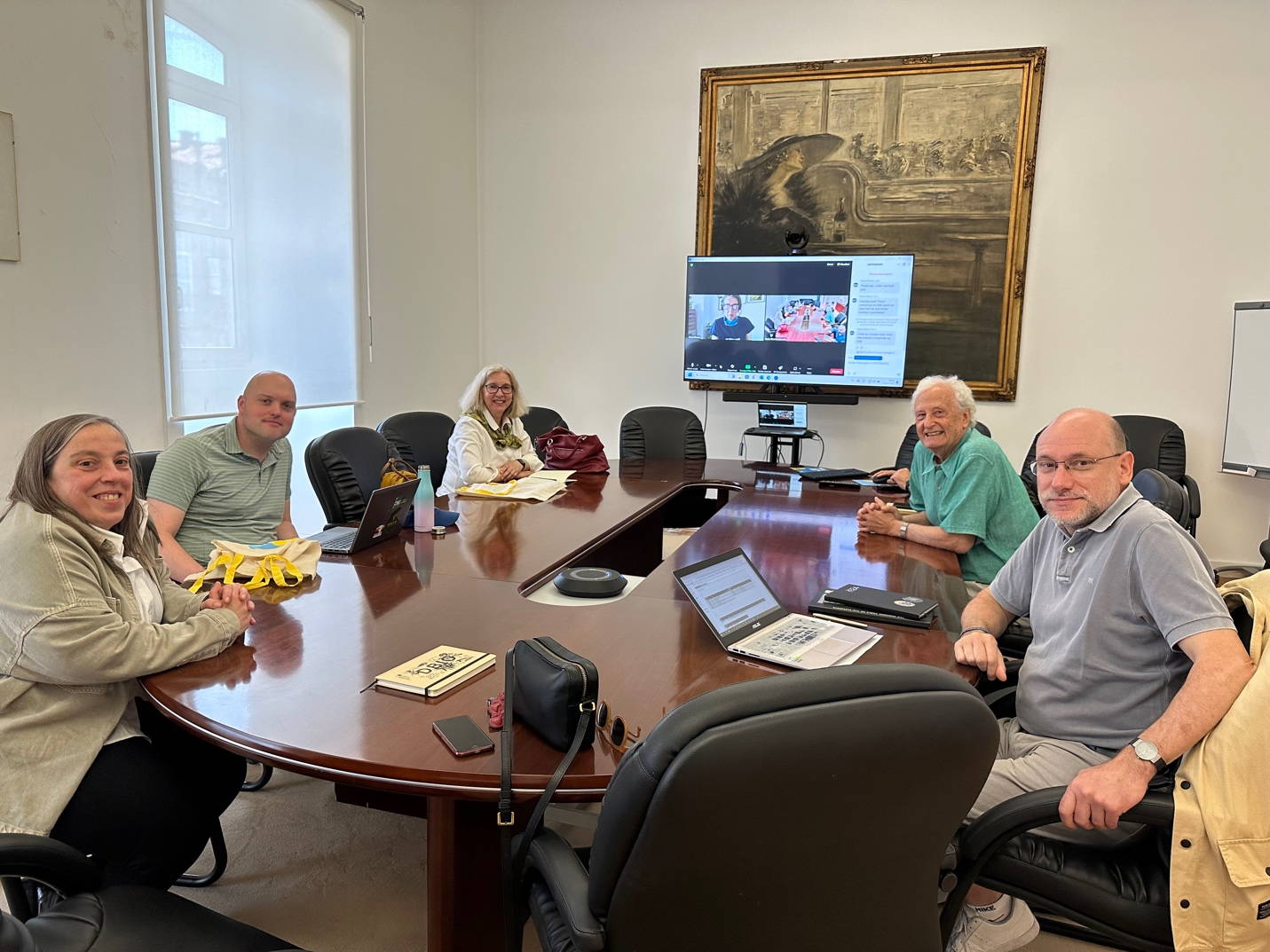 Meeting at the Abel Salazar Biomedical Institute (Instituto de Ciências Biomédicas Abel Salazar, ICBAS): Maria Strecht Almeida, Charles Pence, Betty Smocovitis, Alexandre Quintanilha, and Fernando Taveras
Meeting at the Abel Salazar Biomedical Institute (Instituto de Ciências Biomédicas Abel Salazar, ICBAS): Maria Strecht Almeida, Charles Pence, Betty Smocovitis, Alexandre Quintanilha, and Fernando TaverasDrawing on all this, it is obvious, at least to me, that the ISHPSSB is on an upward trajectory and that we are at an important moment in the history of the organization, a pivotal one, in fact. We will shortly reach our 40th year, and for those of us who remember the ISHPSSB before it actually had a name, it has already exceeded that. It is time for us to reflect on the past as we plan for the future, and what we have to do to keep the organization healthy, vibrant, and truly welcome for all. We should also celebrate a bit, and give ourselves a pat on the back, because our organization has not just “held on,” it has also met with notable success, and surprisingly so. I say that because the founders (too many of whom are no longer with us) did not have some grand ambition in mind at the outset. It was supposed to be an informal organization, one that enabled discussion and exchange between scholars from varied backgrounds and disciplines, and who would come together in a casual setting to discuss current and persistent problems in the biological sciences. And then it grew, and grew, becoming an actual international organization, meeting biennially in carefully selected locations that were affordable, comfortable, and safe for as many of us as possible. Our society emerged organically, in other words, morphing into something a bit different with each meeting as it accommodated to members' needs and wishes, taking on a kind of Protean identity with its mix of disciplines and shifting international demographics — a quick look at some of the past programs on our website shows us how much we have grown and have accommodated new members with new interests.
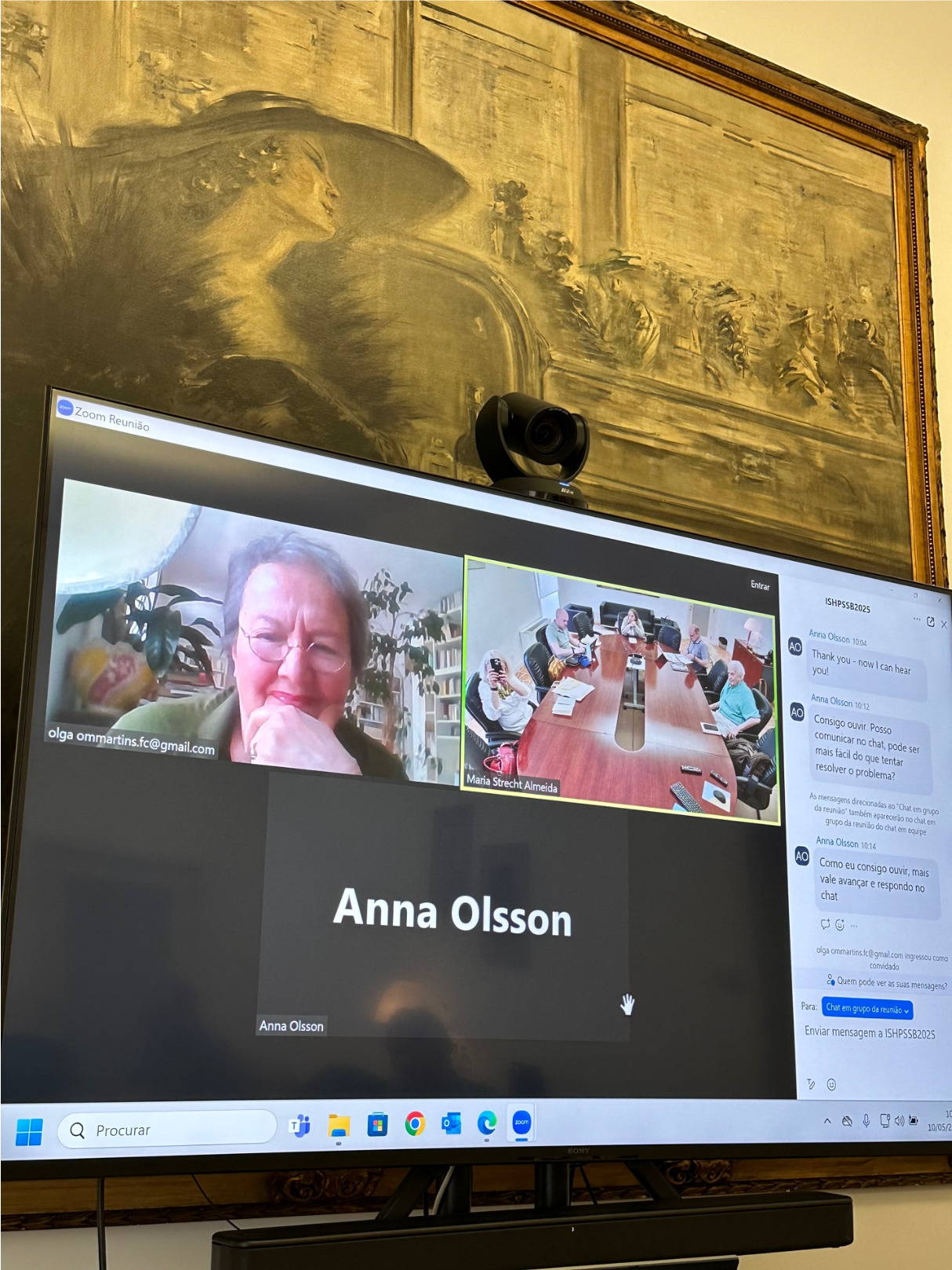 Meeting at the Abel Salazar Biomedical Institute (Instituto de Ciências Biomédicas Abel Salazar, ICBAS): by remote Olga Pombo and Anna Olsson
Meeting at the Abel Salazar Biomedical Institute (Instituto de Ciências Biomédicas Abel Salazar, ICBAS): by remote Olga Pombo and Anna OlssonWe don't want to change any of that, I think, because it has worked so nicely, and we don't want the society to become any more formal or heavily structured than it is now. But we do need to plan for the future, and secure the organization for the long-term, especially in the way of enabling lively meetings that live up to our principles of inclusivity for a global community of scholars. Our meetings are literally the raison d'etre for the organization, and I've always thought we live to meet, was a kind unofficial motto; participation in our meetings is thus especially important for the intellectual life of the organization. Sadly, not all can attend, and too many are shut out; for some, it may because of timing, or teaching commitments, or family obligations, or health, or because of differing abilities that make travel challenging, but especially because of costs which seem to be increasing astronomically.
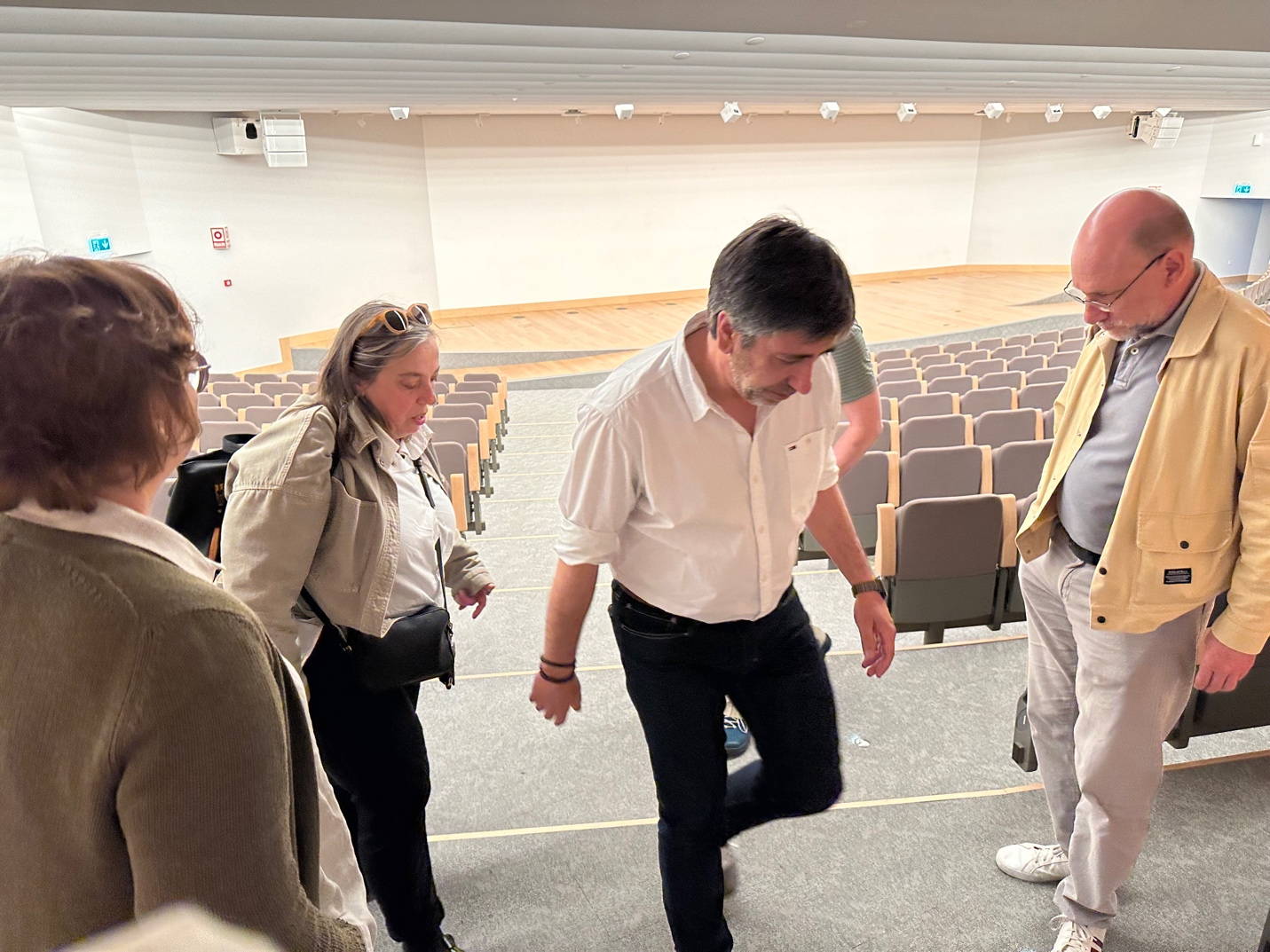 Tour of the Super Bock Arena auditorium with Maria Strecht Almeida, Fernando Tavares
Tour of the Super Bock Arena auditorium with Maria Strecht Almeida, Fernando TavaresBarriers to participation in our meetings are real, in other words, and many of us find it hard to attend, especially in a world experiencing political and economic turbulence. If we want to widen our circle, extend our reach, and be as inclusive as we can be, we have to recognize this, and try to do even more about it. We have to not only continue to choose affordable locations, and adopt equitable practices such as sliding scales for registration, but to provide substantive assistance with travel costs, especially for those of us in under-resourced environments, as well as to adopt technologies that enable some, if not all of us to meet virtually. We also need to increase support for off-year workshops. These have been very successful not just in filling in a gap between our biennial meetings, but also in enabling more of us to convene in varied disciplinary and international configurations on timely topics; combined with remote participation, our off-year workshops have attracted a diversity of participants, with diminished costs, and with minimal damage to the environment, an important concern in our organization. With all this in mind, I've worked with the executive and council to convene a special ad hoc committee charged with raising funds that will enable our growth and participation in an equitable, and inclusive manner that will secure our future. Under the leadership of Don Opitz, our treasurer, this Fundraising Committee has enthusiastically taken up the task, and has begun to lay down the infrastructure to raise an endowment that will help secure the organization's activities for the long-term; some of their ideas have been especially creative and I am grateful to them all for their hard work (please see the report in this newsletter by Don Opitz, chair of the committee for more details about their activities). We may not be able to overcome all the barriers to participation, but we can certainly lower some, especially by allaying more of the costs made possible by a generous endowment.
Another way that we can both grow and secure the organization is by coordinating with related societies. Cognate sessions, for example, invited by cognate societies, with proposals approved formally by the ISHPSSB make for an especially effective way of broadening representation and widening our reach. We've done this before, but we hope to do this even more, making it routine practice. At the moment, cognate sessions with the Philosophy of Science Association (PSA), Society for the Study of Evolution (SSE), and with the International History, Philosophy and Science Teaching (IHPST) group are all actively at play. Council will be discussing affiliations and shared activities with related societies at the Fall meeting further.
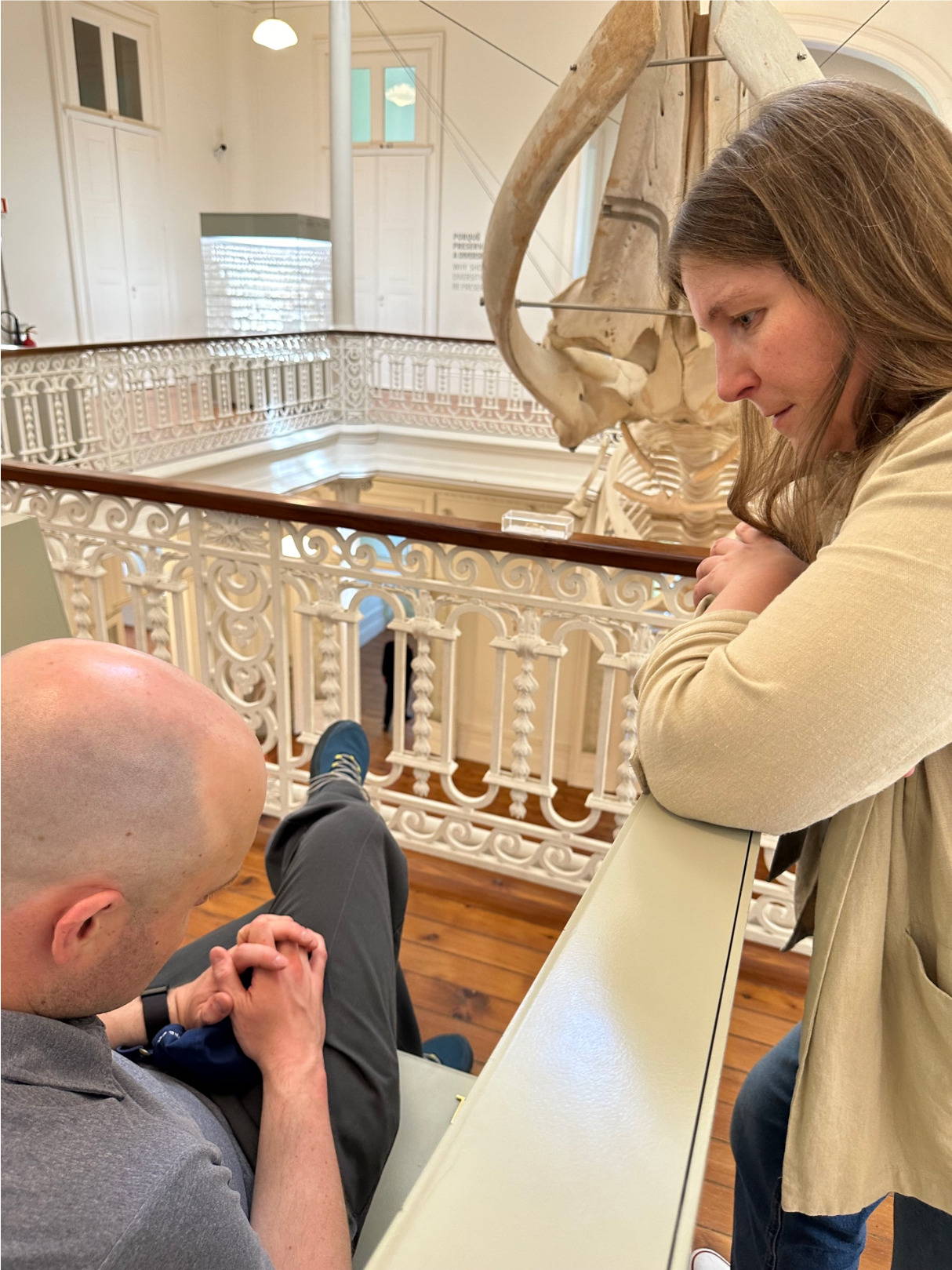 Charles Pence and Maria João Fonseca listen to the heartbeat of a whale at the Hall of Biodiversity
Charles Pence and Maria João Fonseca listen to the heartbeat of a whale at the Hall of BiodiversityYet another way to secure our future is to make sure that our procedures and governance structures both embody and effect our democratic and inclusive values. Our organization has not only grown, but also increased in complexity, making efficient management of the society a challenge. Our trusty “Operations Manual,” the handbook of procedures and governance, has fallen behind our actual practices so it is time to assess, refresh and update it, especially in the light of the by-laws revisions last year. To this end, Sabina Leonelli, our President-Elect, and the Chair of the Operations Committee, is now working with a special Operations Committee charged with revising and updating the manual. Part of their effort has been to retrieve past documents such as minutes and archive them for future reference, to assess the functioning of our many committees, and to make sure our timetable, a very important part of our operations, is actually keeping us on track. Yet another task, especially challenging, is to establish effective policies and procedures for providing organization-wide letters and statements of support, following a request from colleagues in Argentina undergoing seismic disruptions. Council voted unanimously on providing such a letter of support, but also thought it important to have a clear policy in place, as well as hope that such letters and statements are not often needed.
So, we've been active in terms of planning for the longer term, but we have also been working for the shorter term too, with the 2025 meeting in Porto, Portugal unfolding very nicely, and well in advance of meetings past. Arrangements at both the local level and with the program committee are moving very quickly and efficiently this year for a reason, and that is we want to make sure that everyone can make it without visa hitches, glitches, or miscommunications (yet another barrier for participation for some at the meetings last year). We want to make sure that members can have acceptances for papers and sessions well in hand, so that they can obtain visas if needed, but we also want to encourage early bookings with both airlines and hotels. Porto is currently one of the most popular tourist hot spots in Europe, and although accommodations are comparatively inexpensive, they will fill up quickly especially for a July meeting. Both the ISHPSSB website and the Porto website are being updated now with important information, so that members can start to make plans for next summer's meeting; the call for papers and proposals has already gone out with a November 1 deadline and members can access our “resource” page on the ISHPSSB website to share ideas for topics and sessions.
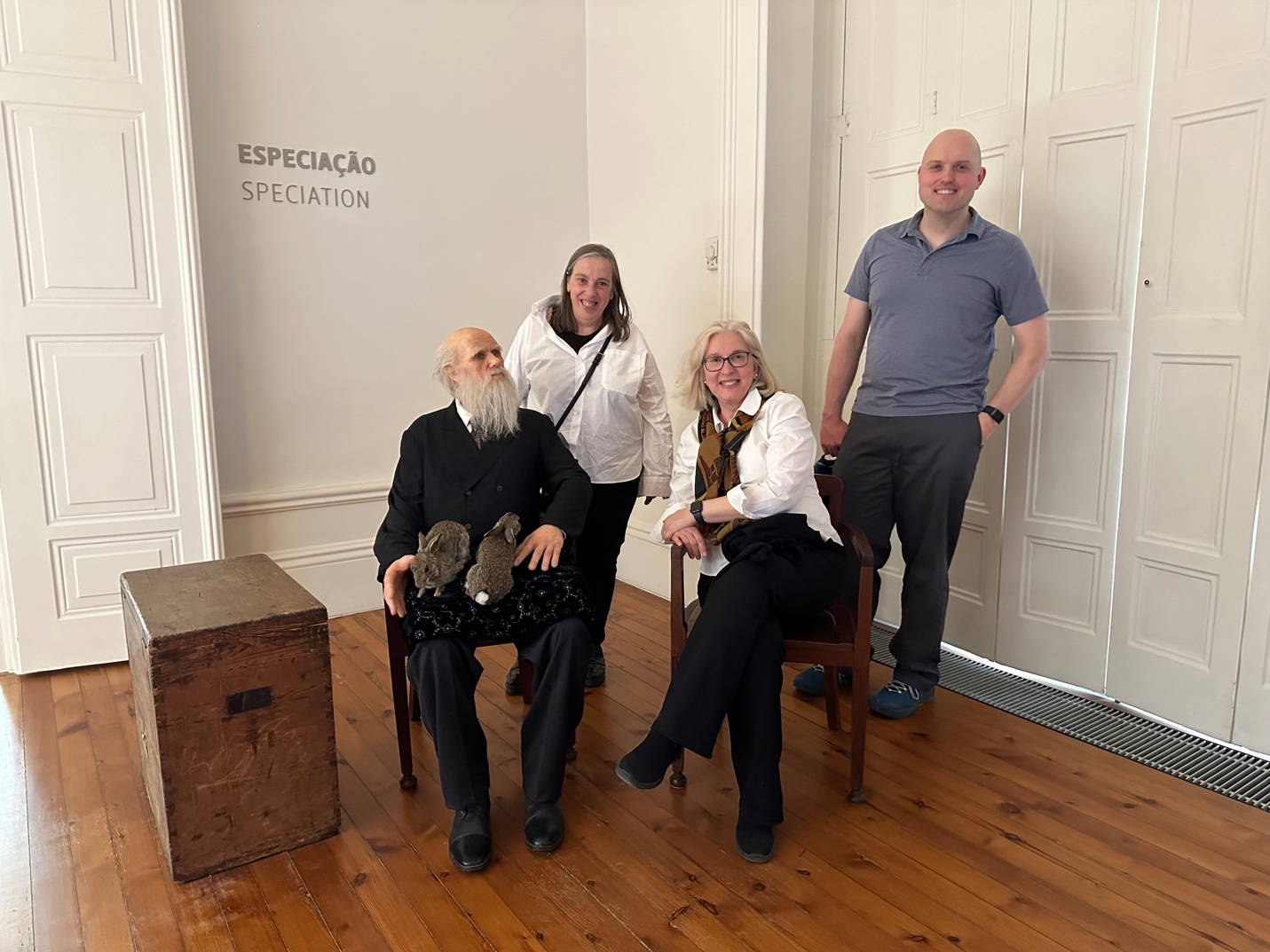 Maria Almeida Strecht, Betty Smocovitis and Charles Pence paying a visit to Charles Darwin and his rabbits at the Hall of Biodiversity
Maria Almeida Strecht, Betty Smocovitis and Charles Pence paying a visit to Charles Darwin and his rabbits at the Hall of BiodiversityFinally, I'm also happy to report that in early May, Charles Pence, our Program Co-Chair, and I made site visit to Porto to meet with the Local Arrangements Committee, and to get acquainted with Porto. We toured the conference venues, assessed the accommodations, checked on available transportation, and explored the beautiful city with its many cafes, restaurants, museums, gardens, and its storied history.
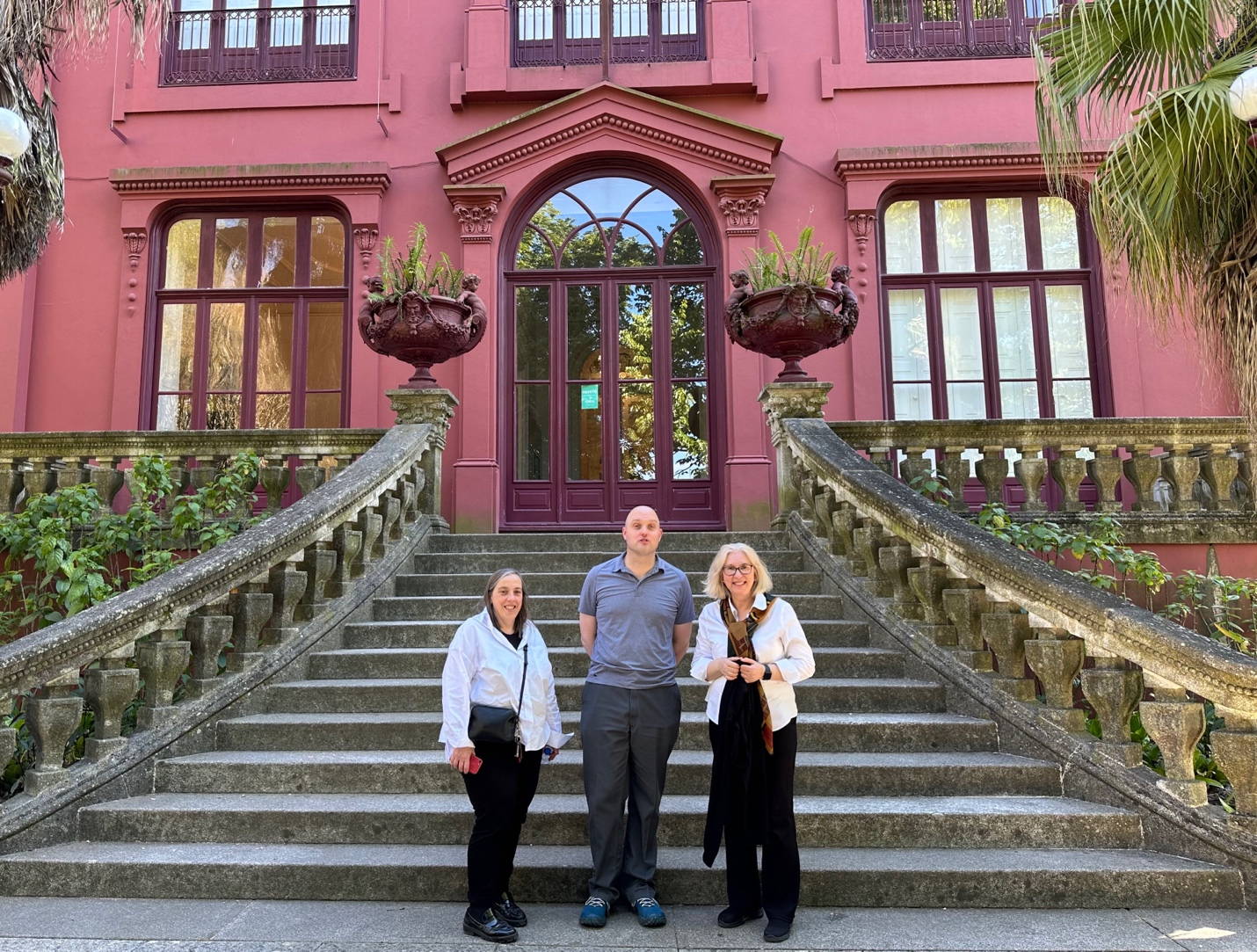 Outside the Hall of Biodiversity and the Botanical Garden: Maria Strecht Almeida, Charles Pence and Betty Smocovitis
Outside the Hall of Biodiversity and the Botanical Garden: Maria Strecht Almeida, Charles Pence and Betty SmocovitisOur visit was made immeasurably successful thanks to Maria Strecht Almeida, the Chair of the Local Arrangements Committee, who introduced us to the organizers in Porto and shared with us her deep knowledge of the city, which you will no doubt see in the choice of venues for social activities. I am also grateful to Maria João Fonseca who took us on a tour of the Hall of Biodiversity and the Botanical Garden and the Core Pole of the Natural History and Science Museum of UPorto, important places for our activities, as well as Fernando Tavares, Chair of the Biology Department at UPorto and our host, the other members of the Local Arrangements Committee who met with us, and special advisors such as Alexandre Quintanilha, former Member of Parliament in the Republic Assembly. I am as excited as could be about the meetings in Porto and hope that they continue the upward trajectory of our very special multi-disciplined, multi-lettered society.
Betty Smocovitis,
President
Working Towards the 2025 ISHPSSB Meeting in Porto
 View of Porto from the Luís I Bridge over the Douro River
View of Porto from the Luís I Bridge over the Douro RiverThe end of August means that the academic year is about to start at the University of Porto and this reminds us that more details of the next ISHPSSB Meeting should be released soon.
As previously announced, the rooms for the sessions have been booked. We have been working on the website (https://ishpssb2025.icbas.up.pt) and, in conjunction with the Program Committee, the way this resource should articulate with the abstract management system and the hybrid part of the conference. We want the next meeting to be truly inclusive! We are working on the accommodation offer and in providing the best conditions for everyone joining us.
The social program is also being worked on, including two main events: a welcome reception and the conference dinner. A few other events are being planned, leaving space for informal social gatherings. Beyond the conference, the city can provide an amazing experience for visitors: those who love museums, architecture, gardens/parks, bars or just walking around — downtown, by the river or by the sea — will have plenty to enjoy.
We are looking forward to see you all in Porto in 2025!
Maria Strecht Almeida
Chair of the Local Arrangements Committee
ISHPSSB 2025: Call for Session Proposals
The International Society for the History, Philosophy, and Social Studies of Biology (ISHPSSB) brings together scholars from diverse disciplines, including the life sciences as well as history, philosophy, and social studies of science. The biennial ISHPSSB summer meetings are known for innovative, transdisciplinary sessions, and for fostering informal, cooperative exchanges and ongoing collaborations.
The upcoming ISHPSSB meeting will be held in Porto, Portugal, from 20–25 July, 2025. The website for the upcoming conference is currently under development.
The submission deadline is 1 November, 2024.
Organized Sessions
We encourage participants to submit organized sessions. They are submitted by one organizer, who must also participate in the session (e.g., chair, presenter, or commenter). All organized sessions will have exactly 90 minutes. There are two different types of Organized Sessions:
- Traditional Session
- Diverse Format Session
To organize a session, you can invite participants directly to form a “closed” session proposal. Or, you can solicit participants by posting on the Open Session Board on the ISHPSSB website. (To use this option, you must be a current ISHPSSB member and login using your ISHPSSB member credential or create an account by signing up for ISHPSSB membership).
A complete proposal for an organized session must include a session title, abstract (up to 300 words), and the contact details for the chair and all participants (first and last name, email, institution, and country). Once the organizer enters the information about the organized session into the proposal system, speakers included in the session will receive an email inviting them to submit their individual submissions for the session in the system. See further instructions and links under the “Submission” heading below.
Traditional Session (3 speakers, 90 minutes)
Each Traditional Session proposal should include three speakers and a chair; the chair may, but need not be one of the speakers. Each speaker will have 30 minutes total, including a discussion. This submission format requires a session title and an up to 300-word session abstract; titles and up to 300-word abstracts for each talk; and the names, affiliations, and email addresses for all participants. It is possible to submit a double Organized Session, with the same title, six speakers, with two 90 minutes slots.
Diverse Format Session (2+ participants, 90 minutes)
Each Diverse Format Session should have at least two participants, including a chair who may be one of the participants. These sessions may be organized as roundtables, panels, dialogues, theater games, performance lectures, longer talks, lightning talks, commentaries, films, artistic performance-based formats, etc. This submission format requires a session title and an up to 300-word abstract, as well as the names, affiliations, and email addresses for all participants. Additional information relevant to the particular format (for example, short bios in the case of panels) can also be included in the information submitted by the session organizer.
Individual Papers (oral presentations)
Individuals may also submit a paper proposal, which requires a paper title, an up to 300-word abstract, and the full names, affiliations, and email addresses of the presenter and all co-authors. The submission should be made by the person who will present the paper at the meeting. The paper presentation must be no more than 20 minutes in length, with an additional 10 minutes for discussion. Individual Paper submissions will be grouped and scheduled into 90-minute sessions by the Program Committee. Individuals may submit only one individual paper or present as part of one organized session, but may also chair a session and/submit a poster.
Before submitting your individual paper, please check the Open Session Board to see if there might be a proposal for an Organized Session that your contribution fits within.
Poster Presentations and Poster Flash Talks
The submission for the Poster Session requires a title and up to 300-word abstract, and the full names, affiliations, and email addresses of the presenter and all co-authors. If your poster presentation has particular technical and/or space requirements (over and above a board to hang a standard academic poster), please contact
Poster presenters may additionally submit a video for a flash talk (1 min) that introduces your poster in a brief, accessible and, if possible, entertaining way. At the start of the poster session, we will have a poster slam in which the submitted flash talk videos are screened. All accepted flash talks will be automatically considered for the new prize for the best (and most entertaining) poster flash video (see below).
Participants who propose a poster are also allowed to submit an individual paper or to participate in an organized session.
Participation in multiple sessions
You may give one oral presentation (in an organized or diverse format session, or as an individual paper), as well as chair one session and/or give a poster (including a flash talk).
Prizes
To encourage interdisciplinary exchange, participants can apply for an Interdisciplinary Organized Session Prize (US$ 500). The session organizer should select this option when creating an organized session. Candidate sessions are expected to stand out as a fruitful combination of approaches or methodologies from several of the ISHPSSB disciplines, and especially through contributions from the social studies and history of the life sciences. Besides this, the meeting will also give a prize for the best (and most entertaining) submitted poster flash talk (US$ 300).
In-person or hybrid presentation
Sessions may be in person or hybrid. While we understand that attending in person will not be possible for all participants, we may not be able to accommodate all requests for hybrid sessions due to the technical and personnel requirements of good hybrid meetings.
In hybrid sessions, to enable fruitful discussions, at least 2 (out of 3) speakers need to present their papers in-person. All chairs should be present in Porto. The schedule of all sessions, including hybrid ones, will be adapted to the meeting location in Porto. Posters will be presented in person in Porto.
NOTE: If, due to visa application requirements, you need to know the outcome of the abstract proposal assessment early, please get in touch with the program committee at
Submissions
To submit your organized session, individual paper, or poster:
- If you are the organizer of an organized session, please fill out this form with your details, then enter the e-mail addresses of all participants in the session to invite them to submit their contributions.
- If you are submitting an individual paper or poster, please fill out this form with your details.
- If you are a participant in an organized session, please wait to receive an e-mail inviting you to submit your submission after the organizer of your session creates the session in the system.
Kate MacCord and Charles Pence,
Co-Chairs of the ISHPSSB 2025 Program Committee
2025 Grene and Callebaut Prizes — Call for Submissions
The International Society for the History, Philosophy, and Social Studies of Biology (ISHPSSB) invites submissions for the 2025 Marjorie Grene Prize and the 2025 Werner Callebaut Prize.
Both prizes aim to advance the careers of early career scholars in the ISHPSSB community. The prizes are awarded to outstanding manuscripts developed following a talk or poster at one of the two most recent ISHPSSB meetings (CHSL 2021 or Toronto 2023) by presenters who were graduate students at the time of presentation and the leading author of the submitted paper. We detail the two distinct prize categories below.
2025 Marjorie Grene Prize
ISHPSSB named this prize in Marjorie Grene's honor not only because of her contribution to the history and philosophy of biology, but because she helped create the spirit of interdisciplinarity so fundamental to ISHPSSB. Grene was a valued mentor to many members of the Society and a long-standing inspiration to all for the excellence of her work and her actions in bringing together diverse scholars of biology, even before the formation of the Society. The prize thus honors Grene's legacy by supporting today's early career scholars in the history, philosophy and/or social studies of biology.
The award consists of a certificate and an award of US$500, as well as a permanent record of the award on a plaque which circulates every two years to the current winner(s).
2025 Werner Callebaut Prize
The prize named in honor of Werner Callebaut celebrates Callebaut's contribution to the philosophy of biology. His mentorship guided the intellectual and personal development of countless philosophers and scientists, contributing greatly to ensure that philosophical and scientific work evolve in constructive dialogue and reciprocal respect. Callebaut's untimely death in 2014 inflicted a serious blow to the philosophy of biology community worldwide. His work reached creatively across fields relevant to a philosophical understanding of biology, comprising areas as far removed as economics, evolutionary biology, history, sociology and cognitive science, as well as crossing national cultures, languages and traditions—most notably the 'continental-analytic' divide in philosophy. The Callebaut prize thus focuses on recognising early career scholars' interdisciplinary, boundary-crossing work, which is at the core of the ISHPSSB community.
The award consists of a certificate and an award of US$1000, as well as a permanent record of the award on a plaque which circulates every two years to the current winners.
How to Submit your Paper
Authors are requested to submit a cover sheet introducing their submission, where they may specify whether they would like to be simultaneously considered for the Grene and the Callebaut prizes. Please note that a paper cannot win both prizes.
Submissions should be in the form of a paper prepared for submission, or already submitted, to a professional journal, specifying the journal in question. In the case of the Callebaut prize, a brief statement (max 500 words) describing the paper's interdisciplinarity must also be provided.
An electronic copy (in Microsoft Word or PDF format), together with the required cover sheet (accessible here) should be emailed as one document to the Chairs of the Grene and Callebaut Prize Committee, Sophia Efstathiou (
The deadline is the 1st of March 2025. The winning papers will be announced at the 2025 ISHPSSB conference in Porto.
The awards committee reserves the right to split the award, or to not give an award.
With thanks to the Konrad Lorenz Institute for Evolution and Cognition Research (KLI) for financial support for the Callebaut Prize.
Sophia Efstathiou and Yafeng Shan
Co-chairs of the Grene and Callebaut Prizes Committee
ISHPSSB Fundraising [Advisory] Committee
Last summer in Toronto, Council approved the appointment of a new ad-hoc Fundraising Committee for the Society, chaired by the Treasurer. With its members recently appointed, the committee held its inaugural meeting on February 23, 2024. The committee includes Don Opitz (chair), Fiorella Alassia, Jarret Joubert, Greg Radick, and Marsha Richmond. The committee identified a range of objectives which includes the following: setting Society fundraising goals and strategies, to include dedicated campaigns; elevating the visibility, importance, and value of gift-giving to the Society in support of its mission; cultivating and sustaining affinity for the Society among its members and stakeholders; promoting the endowment of prizes; and identifying assets and further resources which will be needed to achieve fundraising goals.
The committee met again on May 3, 2024 and plans to meet again later this summer. We expect to propose to Council a strategic fundraising plan, along with recommended tactics and required resources, in the months to follow. We welcome expressions of interest from members who are keen to contribute to our committee’s efforts.
Don Opitz
Treasurer
Lucie Laplane — New ISH Listserve Moderator
 Lucie Laplane is a CNRS researcher in Philosophy of Biology in Paris. She works at IHPST (Univ Paris 1) and in the cancer center Gustave Roussy, where her group is hosted in a team of experimental hematology. She works on the biology of cancer.
Lucie Laplane is a CNRS researcher in Philosophy of Biology in Paris. She works at IHPST (Univ Paris 1) and in the cancer center Gustave Roussy, where her group is hosted in a team of experimental hematology. She works on the biology of cancer.
ISH's Wikipedia page
Back in 2020, as we started to develop online communities and spaces for ISHPSSB events, I created the ISHPSSB Wikipedia page under the account @FlybellFly. Digging through past newsletters archived on the ISH website, I attempted to offer a documentation of the history and significance of the society, including the backstory of our society's "official" pronunciation: "ishkabibble." (Fun fact, the page was then featured on the "Did you know…" section of the front page of Wikipedia on December 28th, 2020: "Did you know… that the first official resolution of the International Society for the History, Philosophy, and Social Studies of Biology was that they would never meet in a place with anti-sodomy laws?") At the time, the intention was to then organize an off-year meeting in collaboration with the Student Committee to submit and improve entries on historically marginalized members of ISHPSSB in a global, online "Wikipedia Edit-athon" (modeled after the Wiki4Climate edit-a-thon, in the spirit of the Women in Red Wikiproject). While the idea didn't take off at the time, it is important that we continue our work towards maintaining and improving the ISHPSSB page as well as its related entries. We would thus like to mobilize the collective memories of our members to locate and document important information to add to the ISH Wikipedia. We are missing, for instance, information from newsletters before the 1995 issue 12 (thankfully, that issue reprinted the origin of ISH's pronunciation from a 1994 newsletter!). It would be wonderful if we could find a copy of co-founder Richard Burian's historical account of the society.
Please note that edits to the page should cite reliable sources (e.g., links from the ISH website)! If you happen to have documents that can go into the ISH archive, please reach out to add it to the website as well!
Lynn Chiu
An interview with Jun Otsuka about his book, Thinking About Statistics: The Philosophical Foundations
Brian McLoone (BM): Most of the readers of this newsletter work in areas related to biology. How might your book be useful to them?
Jun Otsuka (JO): Most if not all biological studies use some form or another of statistical methods. If you want to conclude something about a population based on observation, you must use statistics. I don't think it is a coincidence that the founding fathers of evolutionary genetics (Pearson, Fisher, Wright) were also the founders of the major statistical ideas (correlation, likelihood, path coefficients). But many scientists, including biologists, use statistics just as a tool, without paying much attention to why and how using such a tool could justify the conclusion they want to make. This results in inappropriate or unwarranted interpretation of statistical results (such as using AIC to measure the strength of causal effects) and even invites a reproducibility crisis. To avoid such pitfalls, one needs to know not just how to compute p-value or posterior probabilities but also what such statistical procedures and indices mean. My book answers this question, by clarifying (without complex maths!) the epistemological nature of various kinds of statistical methods, including Bayesian statistics, hypothesis testing, model selection, and causal inferences.
BM: You distinguish a probabilistic model from a statistical model. As I understand the distinction, a probabilistic model is the objective process that generates the data, whereas a statistical model is the formal model we use to describe and make predictions about the probabilistic model. You also talk about "probabilistic kinds." Can you explain what a probabilistic kind is and how that idea connects to the probabilistic/statistical model distinction?
JO: Yes, as you correctly put it, a probabilistic model represents nature itself (or what philosophers call "uniformity of nature"), while a statistical model is a hypothesized model of that nature. Well-known distributional families (e.g. Normal, Poisson, chi-squared, t, binomial, etc.) and various regression models (multiple regressions, generalized linear models, etc.) are all examples of statistical models. It is crucial to recognize that they are "models" of nature and not nature itself. The real biological population is never normally distributed. We use a normal distribution because we think it approximates well the reality (as Box puts it, "all models are wrong, some are useful").
What I refer to as "probabilistic kinds" are essentially these statistical models. This is because statistical models categorize reality into discrete kinds: by modeling phenomena with a Bernoulli distribution, for instance, we classify these phenomena (they may be coin tossing, survival, or sex determination) into one kind—i.e. a binary chancy setup. Or, in other words, statistical models encode how we see phenomena. In this sense, statistical models serve as what philosophers call "natural kinds," hence the name "probabilistic kinds" (because they are natural kinds that behave probabilistically).
BM: You write that "…any statistical method, either Bayesian or frequentist, cannot be content with staying within just one epistemological framework." I could imagine some Bayesians (or frequentists) who disagree. Let's focus on Bayesians. What is the most compelling argument you have that Bayesians can't stay just within that epistemological framework?
JO: Bayesian statistics is fundamentally about consistency. Subjective Bayesians place paramount importance on adjusting their degrees of belief to achieve consistency. To this end, all data and hypotheses must be expressed in terms of beliefs, leaving pure Bayesians with no concept of an "outside." In this regard, subjective Bayesianism resembles Berkeley's Idealism, where the only existents are ideas. This itself is a consistent philosophy, but I doubt it satisfies all scientists. Many scientists hold that an "outside" exists and expect statistics to offer a glimpse into it. But once we introduce the outside and try to connect the internal system of beliefs to the external world, we face a vexed epistemological problem. Of course, this is a genuine problem that no one has (and I fear never will have) a definitive answer to. So I don't say that Bayesians should give up their framework. But I do think it has a limitation (as any epistemological doctrine does), and taking its limitation seriously is a necessary humility in engaging inductive inference, which, as Hume pointed out, is a logically impossible endeavor.
BM: The second-to-last chapter of your book is about causal inference. In the preface to your book, you note that the book was first written in Japanese, then you re-wrote it in English. I'm curious how easily causal language in Japanese (about which I know nothing) can be translated into causal language in English.
JO: Interesting point, but as far as causal language is concerned, there's not so much difference between Japanese and English. But there is a difference in counterfactual language. Subjunctive conditionals do not sound quite natural in Japanese. Not that we don't have them, but just that they do not belong to colloquial Japanese. So, in this sense, the discussion in chapter 3 (esp. on Nozick's counterfactual conditions) may have sounded a bit unfamiliar to Japanese readers.
Speaking of translation, it took me a lot of time to translate this book. Initially, I assumed it would be straightforward since I am the author. That assumption proved incorrect. The primary challenge stems from the fundamental differences in logical structures and argumentative flows between Japanese and English. Arguments that are natural and convincing in Japanese often turn obscure and weaker when translated into English. Consequently, in many sections, I found myself rewriting sentences or even entire paragraphs. This is why I mention in the preface that this work is more of a rewrite than a translation!
BM: You've done important and interesting work showing how one can derive standard equations from evolutionary theory by assuming there is an underlying model describing the causal relationship between traits and fitness. What would you say to someone who thinks that this is a useful way to conceptualize what's going on in nature, but that in reality nature is so messy—e.g., feedback loops, faithfulness violations—that automated causal inference is close to hopeless?
JO: I fully agree with the first part: in reality nature is so messy that any DAG-like representation can at most be a very limited hypothesis. It might be even better to call it an assumption rather than a hypothesis, an assumption for using a certain evolutionary formula. I also agree that the causal inference of a biological population is hard, really hard, that it is very unlikely to attain a complete causal picture by itself. But this difficulty is not peculiar to discovery algorithms, but applies to all empirical methods for studying wild populations. In that respect, I believe that algorithmic search presents a good heuristics for getting a rough sketch of complex causal systems, which can then be examined by experimental studies.
Brian McLoone
Recent publications
Recent contribution to the historiography of evolutionary debates
A historiography of conflicting evolutionary viewpoints has been set out in the second edition of a biography of the geneticist William Bateson by Cock and Forsdyke (2022) and in a biography of Raphael Weldon by Gregory Radick (2023). Donald Forsdyke (Queen’s University, Canada) has now extended the historiography in geopolitical terms in a paper entitled “Speciation, natural selection, and networks: three historians versus theoretical population geneticists”. The three historians are Michael Boyer Adams, William Provine* (both historians of science) and Forsdyke (scientist historian). First published as a preprint in the Social Sciences Research Network (2022), the final version is in Theory in Biosciences 143, 1-26 (2024).
Donald R. Forsdyke
Emeritus Professor, Queen's University
*William Provine died in 2015. Mark Adams died May 9th 2024.
History of genomics
A new book unveiling previously overlooked aspects of the history of genomics has been published at the culmination of the Medical Translation in the History of Modern Genomics (TRANSGENE) project, which was funded by the European Research Council.
The monograph, entitled A History of Genomics across Species, Communities and Projects, offers an extensive chronological and analytical account of the development of this scientific field. It provides a detailed picture of the rise and consolidation of genomic research across three different species—yeast, human and pig—and over four decades, from the 1980s to the recent past.
The authors Miguel García-Sancho and James Lowe take an inclusive approach in order to capture not only the international initiatives to map and sequence the genomes of these three organisms, but also the work of smaller-scale institutions. In doing so, they expand the historiographical lens of genomics and argue that existing depictions are too closely associated with the activity of the large-scale sequencing centres that undertook the Human Genome Project.
By exploring the use of genomic tools by biochemists, cell biologists, and medical- and agriculturally- oriented geneticists, the book portrays the history of genomics as inseparably entangled with the day-to-day practices and objectives of these communities. Offering the first extensive critical examination of the nature and historicity of reference genomes, the authors demonstrate how their affordances and limitations are shaped by the involvement or absence of particular communities in their production.
A History of Genomics across Species, Communities and Projects is available for purchase and open-access download at: https://link.springer.com/book/10.1007/978-3-031-06130-1
James Lowe
Islamic Theology and Extraterrestrial Life
A new volume on this topic, edited by Shoaib Ahmed Malik and Matthias Determann, has been recently published. It is entitled Islamic Theology and Extraterrestrial Life: New Frontiers in Science and Religion (London: I.B. Tauris, 2024). Free review copies are available from the author and the publisher. You can find more information about the book here: https://www.bloomsbury.com/uk/islamic-theology-and-extraterrestrial-life-9780755650880/
Matthias Determann
Credits
This newsletter was edited by David Suárez Pascal employing GNU Emacs and Scribus (both open source and freely available). I thank Betty Smocovitis for proofreading it and to all the ISH members who kindly contributed to this issue with their texts.
The logo of the society was generously contributed by Andrew Yang.
Submissions for the newsletter should be addressed at:
